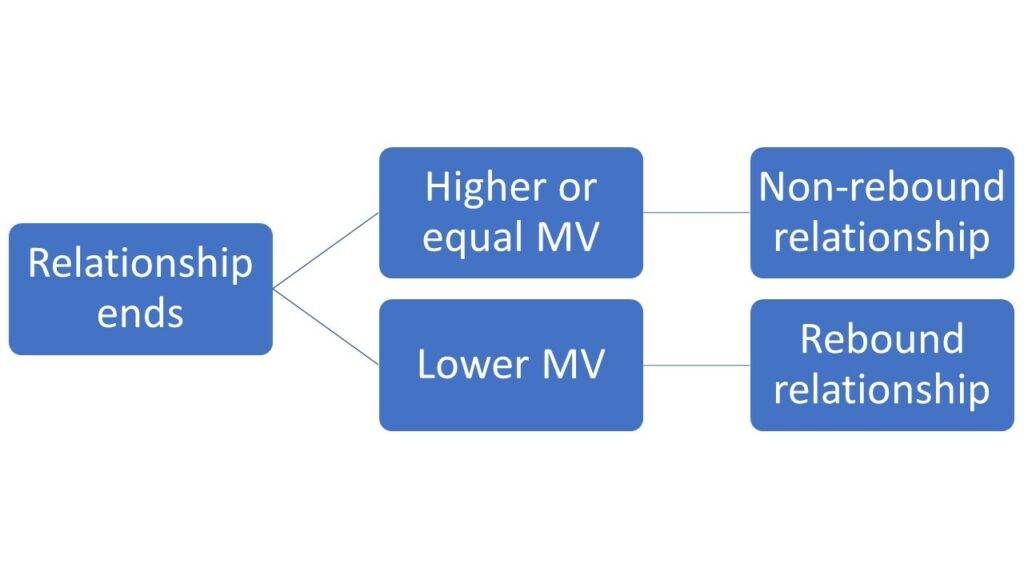A rebound relationship is a relationship that a person enters into soon after the end of a serious, prior relationship. The word ‘rebound’ conjures up scenes of an object (such as a rubber ball) bouncing off quickly from wall to wall.
Similarly, a person who enters a rebound relationship- the rebounder- gives the impression that they’re quickly bouncing off from one partner to another.
The common advice out there is that rebound relationships are bad and bound to fail. Let’s briefly go over the main reasons experts and other well-meaning people give for why rebound relationships fail:
1. No time to heal
The argument here is that a rebounder doesn’t take the time to learn from the previous relationship and heal.
Breakups tend to be traumatic. If one hasn’t dealt with the breakup trauma appropriately, these unresolved feelings are likely to haunt them, possibly ruining their rebound relationship.
2. Short-term fix
Rebound relationships are like an emotional band-aid. They help the person cope with the negative emotions of the breakup. This coping is unhealthy because the person fails to address the underlying issues that led to the split.
Consequently, the same issues arise in the rebound relationship, which is also doomed.
3. Making ex jealous
Rebounders try to make their ex jealous by posting pictures of their new relationship on social media. Making someone jealous is a lousy reason to be choosing a relationship partner. So, a rebound relationship is bound to fail.
4. Superficiality
Since rebounders are looking to enter a new relationship quickly, they’re likely to emphasize superficial traits like physical attractiveness in their new partner while ignoring deeper things like personality.
Is that all there is to it?
While the above reasons make sense, and some rebound relationships may end because of one or more of these reasons, there’s more to the story.
First, it doesn’t always take people long to heal after a breakup. Healing depends on so many things. For instance, if the rebounder finds a better person than their ex, they’ll recover as quickly as hot cakes sell.
Second, the ‘emotional band-aid’ argument can apply just as well to non-rebound relationships. People enter normal, non-rebound relationships to escape negative emotions like depression and loneliness all the time.
They’re not necessarily ‘wrong’ reasons to enter a rebound relationship.
Third, making your ex jealous can also be a part of a non-rebound relationship. The idea that a person is not really over with their ex if they show off their new partner may or may not be accurate.
Lastly, people do take into account the so-called superficial traits in non-rebound, long-term relationships. When people choose their relationship partners, they usually consider a combination of superficial and deeper traits of their potential partner.
All this isn’t to say that rebound relationships don’t exist. They do, but the only thing differentiating them from non-rebound relationships is time. They’ve entered the new relationship relatively quickly and after the end of a significant prior relationship.
We must avoid labeling all rebound relationships as toxic and doomed to fail. Rebound relationships generally have negative connotations, and we’ll later get to the possible reasons why.
Understanding the rebound phenomenon
Before we call rebound relationships toxic or healthy or emphatically declare that they’re bound to fail, let’s quit rebounding, settle down and take time to understand what’s going on.
Whenever I think of relationships, I always think about mate value because it makes things easier to understand.
If you’re new to this concept, mate value means how desirable a person is in the human dating and mating marketplace.
When you say “She’s a 9” or “He’s a 7”, you’re talking about their mate value.
People who have similar mate values are likely to enter into stable relationships. You can’t expect a 9 to pair up with a 5. A 9-9 and 5-5 relationship is much more likely to be stable.
Now, humans are selfish and want to get more than they can give. So, they seek partners with slightly higher mate values than their own. If they go too far, they risk entering into an unstable relationship. But they’ll push the envelope as far as they can.
When a relationship ends, the lower mate value person takes it harder. Their self-esteem takes a hit, and their perception of their mate value drops.
Their mind comes up with this logic:
“If I’m attractive, how come I’m unable to attract and retain a partner. Therefore, I’m unattractive.”
This is not a pleasant state to be in and leads to sadness, depression, and loneliness.
So, to give their self-esteem a much-needed boost and overcome negative emotions, they double their mating effort and enter into a rebound relationship.
They’ll go to bars more frequently, approach strangers more, send friend requests to more potential partners, and hit up more people on dating sites.
Alternatively, people in an unsatisfying relationship may have been eyeing someone for long. They were waiting for the current relationship to end so they could quickly rebound or may even start a relationship before their current relationship ends.
Let’s just call the latter cheating and not come up with a fancy term like ‘pre-rebound relationship’.
When and why rebound relationships fail
Just because a person enters a new relationship quickly doesn’t necessarily mean that the rebound relationship will fail. It depends on the mate value of the rebounder, their new relationship partner, and their ex.
Two possibilities arise:
1. The new partner has equal or higher mate value
The rebound relationship will likely last if the new relationship confers more benefits to the rebounder than the previous one.
In other words, if the rebounder was previously paired with a lower mate value person and now finds someone with equal or higher mate value, the rebound relationship will likely succeed.
The rebounder’s self-esteem will quickly rise, and their self-perception of their mate value will improve.
Studies show that the speed with which people enter new relationships after a breakup is associated with greater psychological health.1
Rebound relationships are not band-aids. They’re quick recoveries.
Think of it as losing a job. If you lose a job and quickly find an equally good or a better one, won’t you feel better?
Sure, you may want to reflect and heal after a job loss, but if you’re going to feel better, nothing will work like getting a new job.
Authors who say that 90% of rebound relationships fail in the first three months are just trying to scare people for some reason. They don’t mention where they got that statistic from.
The opposite may be true: More rebound relationships work than fail. Large-scale surveys of marriage data show no evidence that divorce rates are higher for rebound relationships.2
2. The new partner has a lower mate value
This is where it gets really interesting.
Higher mate value folks don’t worry about breakups too much because they know they can easily find another mate. But if they’re paired with someone with a higher mate value than them, the breakup can hit them hard.
A low mate value person previously paired with a high mate value person finds it hard to get over their breakup.
When people lose someone valuable, they feel awful and become desperate. In desperation, they may lower their standards and find a new mate whose mate value is comparable to theirs or even lower.
Partners who have a lower mate value than yours are easy to get. But such rebound relationships are likely to fail because the higher mate value ex will haunt you.
Unsurprisingly, research shows that unrewarding rebound relationships make people feel more attached to their ex-partners.3
Unrewarding relationship = Being in a relationship with a person of lower mate value than yours
If you think your partner is in a rebound relationship with you and you’re worried it might fail, consider the mate value of their ex. If it’s high, your partner may have trouble getting over them completely.
If your relationship turns sour, you can bet your partner will consider reuniting with their old flame.

Why people think rebound relationships are bad?
Despite research demonstrating that rebound relationships are more beneficial than typically believed, why do people think they’re bad?
Part of it is a false belief that heartbreaks always take time to heal.
I think it mostly comes from hurt people trying to boost their ego.
When you go through a breakup and see that your ex has moved on quickly, it adds salt to your wounds. So, you try to convince yourself that it’s a rebound relationship that’s bound to fail.
The reality is that a lot of rebound relationships work. They work like a charm in improving a person’s mental health and help them move on quickly from their ex.
The reason some of them fail may have nothing to do with their ‘reboundness’ and more to do with the mate values of the people involved.
References
- Brumbaugh, C. C., & Fraley, R. C. (2015). Too fast, too soon? An empirical investigation into rebound relationships. Journal of social and personal relationships, 32(1), 99-118.
- Wolfinger, N. H. (2007). Does the rebound effect exist? Time to remarriage and subsequent union stability. Journal of Divorce & Remarriage, 46(3-4), 9-20.
- Spielmann, S. S., Joel, S., MacDonald, G., & Kogan, A. (2013). Ex appeal: Current relationship quality and emotional attachment to ex-partners. Social Psychological and Personality Science, 4(2), 175-180.

